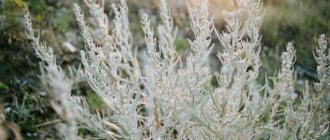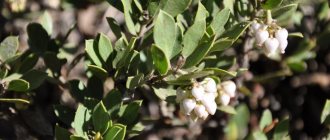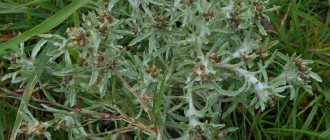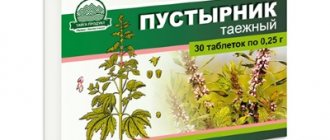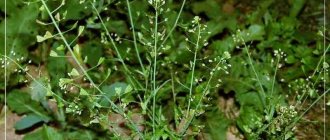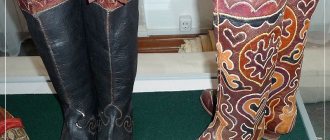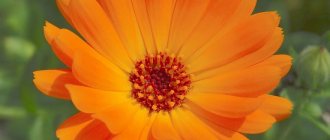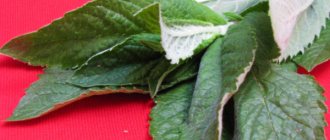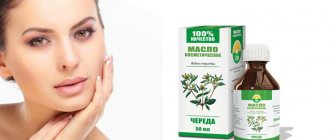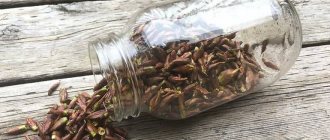The healing properties of representatives of the plant world are not known to everyone. That is why the purpose of our articles is to introduce readers to some of the most useful gifts of nature. One of them is eucalyptus - the most interesting and world-famous exotic tree.
People jokingly nicknamed the tree “shameless”, this is due to the fact that it is capable of “eternally rejuvenating” by independently freeing itself from the bark, thereby, as it were, becoming naked.
Mode of application
Place two tablespoons of leaves in an enamel bowl, pour in 200 ml of hot boiled water, close the lid and leave in a boiling water bath for 15 minutes. Cool at room temperature for 45 minutes, strain, and squeeze the remainder into the strained infusion. Bring the volume of infusion to 200 ml with boiled water. Shake the infusion before use.
Apply externally for inhalation and rinsing 3-4 times a day:
- adults and children over 12 years old - dilute one tablespoon of infusion in 200 ml of boiled water;
- for children 7-12 years old - dilute one dessert spoon of infusion in 200 ml of boiled water;
- children 3-7 years old - dilute one teaspoon of infusion in 200 ml of boiled water.
The duration of treatment is determined by the doctor individually for each patient.
Beneficial features
Eucalyptus is an excellent antiseptic [4]. It cleanses the human body of staphylococci, streptococci and dysentery bacillus [5]. The plant serves as a kind of prevention of the growth of trichomonas, which can penetrate the genital tract and destroy the human genitourinary system. Eucalyptus is able to prevent the development of Mycobacterium tuberculosis and completely remove them from the body at the initial stage of infection.
The medicinal properties of eucalyptus are successfully used in both alternative and conservative medicine. If a fever caused by malaria is suspected, the patient is prescribed eucalyptus, in addition to a whole range of additional substances. Tinctures based on the plant relieve redness, heal the wound, eliminate itching and irritation, and start the process of rapid regeneration of the skin [6]. This is what you should have applied to the wound in childhood instead of plantain!
Eucalyptus is prescribed for:
- burns;
- flu;
- catarrhal/putrefactive bronchitis;
- pathologies of the respiratory system [7];
- pharyngitis;
- chronic runny nose;
- sinusitis;
- pathologies of the genitourinary system;
- kidney diseases [8][9].
In medicine, decoction, tincture, alcohol tincture and eucalyptus oil are used. Each remedy has a special composition, healing properties and scope of application [10].
Decoction
The drug is taken for diseases of the gastrointestinal tract, most often the intestines. The decoction relieves swelling, minimizes inflammation and disinfects not only the infected area, but also the cavity around it. Eucalyptus decoction can be used for mouth rinsing or inhalation [11].
Tincture
Alcohol and “pure” classic tinctures are intended for inhalation and oral administration. The product disinfects and prevents the development of inflammation. Alcohol tinctures are prescribed for inflammatory pathologies of the respiratory system, oral cavity and nasopharynx.
Do not self-medicate or take tinctures without a doctor's recommendation. A self-prepared product can harm the body, cause burns and mechanical damage.
Properly prepared and prescribed by a specialist, the tincture instantly relieves pain, stimulates expectoration and fights pathogenic microflora. The substance is used for:
- inhalations;
- douching;
- rubbing;
- ingestion;
- wiping problem areas.
Oil
Eucalyptus oil is used for phlegmon, carbuncles and osteomyelitis. The substance acts as a painkiller and can minimize the symptoms of rheumatism, neuralgic pathologies, and radiculitis. In addition to its medicinal properties, eucalyptus oil performs a purely household function - it repels mosquitoes, midges and other insects [12].
Note!
The description of the drug Eucalyptus twig leaves 75g on this page is a simplified author’s version of the apteka911 website, created on the basis of the instructions for use.
Before purchasing or using the drug, you should consult your doctor and read the manufacturer's original instructions (attached to each package of the drug). Information about the drug is provided for informational purposes only and should not be used as a guide to self-medication. Only a doctor can decide to prescribe the drug, as well as determine the dose and methods of its use.
Contraindications to the use of eucalyptus-based decoctions
Like any medicine, natural products also have some contraindications:
- Pregnancy and lactation period. The contraindication is not strict; consultation with a doctor is necessary. But, definitely, you cannot drink the tincture internally, due to the alcohol content in it.
- Chronic diseases of the liver and biliary tract.
- Ulcer.
- Individual intolerance. You can test for eucalyptus allergies at home by applying the substance to the inside of your elbow. If no negative reactions occur, then the product can be used (slight redness is quite a common reaction).
All about herbs and more
General information
Family: Myrtaceae Botanical name: Eucalyptus Pharmacy name: eucalyptus leaves - Eucalypti folium, eucalyptus oil - Eucalypti aetheroleum. Popular names: Gum Tree, Marvelous Tree, Tree of Miracles, Diamond of the Forest, Shameless. Due to the ability of eucalyptus to absorb moisture - and then evaporate it - they are called “pump trees”. Planet: Jupiter Zodiac sign: Capricorn, Aquarius, Pisces, Gemini, Virgo, Libra Element: air In the language of flowers: memory Main properties of eucalyptus: antiseptic properties, increasing immunity, food, construction, moisture extraction. Eucalyptus oil has an analgesic, anthelmintic, antiseptic and expectorant effect. History: The name "eucalyptus" is derived from the Greek words "ay", meaning "good", and "kalypto", meaning "shelter". Indeed, the stamens of its flowers are located in the axils of the leaves and are well covered. According to legend, Australian Aborigines were the first to discover the healing properties of eucalyptus. Fresh leaves were used to treat purulent wounds and fight against malaria. Grateful Australians call eucalyptus the “tree of life”, “the diamond of the forests”, and the “tree of miracles”. Eucalyptus was brought to Europe in 1788 as an ornamental plant. Features: Eucalyptus, releasing a toxic substance into the soil, suppresses the growth of other plants nearby. They are also unusually well adapted to the frequent fires in Australia, they quickly recover after fires, and fires are even necessary for them and their fruits, because even a completely burnt tree, within a few days after the fire, produces numerous shoots from all the cracks in the trunk that dried out during the fire. In many species of eucalyptus, the fruits burst only after a fire.
Description: There are many types of eucalyptus. Here are its main known species: Ash eucalyptus (Eucalyptus cineria) - a tree up to 25 m high. The leaves are short-petiolate, round or ovate. They are up to 4.5 cm long and 5.5 cm wide. The flowers are arranged in axillary umbels.
Eucalyptus viminalis (Eucalyptus viminalis) is an evergreen tree up to 50 m high. The trunk is straight, with yellowish-white smooth bark that falls in the form of long ribbons. Young leaves are sessile, elongated-lanceolate, 3.5 - 11 cm long, 0.8 - 4 cm wide.
Eucalyptus globulus (Eucalyptus globulus) is a tree up to 40 m tall. Leaves with a thick waxy coating, bluish color. Their length is 7 - 16 cm, width - 4 - 9 cm, young leaves are sessile or stem-embracing. Young plants develop swellings - woody tubers (lingnotubers), which increase in size with age. When the tree trunk is damaged, numerous shoots arise from the lignotuber. This species also reproduces by seeds and produces shoots.
Eucalyptus Dalrympleana is one of the most attractive species of this genus. In favorable conditions, it can reach 40 m in height with a trunk diameter of up to one and a half meters. Its clean trunks with light bark and bright green foliage make it especially decorative. This species climbs slopes up to 1.5 thousand meters above sea level. Hence its name - Mountain gum. It is resistant to heavy snow and cold, and can withstand short-term frosts down to -16°C without significant damage. The height of the largest measured representative of this species, cut down near Kolas in Victoria (Australia), is 105 m.
Only the first three types of eucalyptus are used in medicine.
Places of growth: Australia, USA, New Zealand, Tasmania, Africa, China, Mediterranean, Black Sea coast of the Caucasus, New Guinea, Indonesia, Philippines, Southern France, Spain, Portugal, Greece, Israel, India, Saudi Arabia, Cuba, Southern coast of Crimea . Prefers marshy areas.
Parts used: Wood is used in construction, paper production.
The bark is used in industry and also for paper production. The leaves contain oil, which is used in medicine, as well as juice. Collection and procurement
It is better to combine the procurement of raw materials with decorative pruning of plantings.
Branches should not be broken off. Leaves are collected in summer or autumn, but the best are considered to be those collected in autumn or winter, from approximately November to February. For this purpose, part of the branches is cut down and all the leaves are torn off from them. Dry in a room with good air ventilation or in a dryer at a temperature of 30-40°C; higher temperatures lead to significant losses of essential oil. Store raw materials in glass or iron jars for 2-3 years. Young leaves are collected in the fall, the rest can be prepared all year round, but the best raw materials are obtained during the autumn harvest. Portable ladders and hooks are used to collect leaves. Medicine:
The main biologically active substance in the oil contained in the leaves is eucalyptol. Eucalyptus leaves also contain tannins, healing bitters, resins and phytoncides - substances that have a detrimental effect on a wide variety of pathogenic bacteria. In terms of the content of phytoncides, eucalyptus is ahead of all deciduous trees and herbaceous essential oil plants.
In medicine, cut leaves are used in 100 g packages, decoction, tincture, briquettes, eucalyptus oil, Chlorophyllipt preparations (1% alcohol solution, used topically and orally; 2% solution in oil, used topically; 0.25% solution in ampoules used intravenously), "Inhalipt", "Ingakamf".
“Efkamon” ointment, “Golden Star” balm, “Pectusin” tablets. "Eucalimin" (0.25% and 1% alcohol solution). Eucalyptus destroys dysentery bacillus, streptococci and staphylococci; it suppresses the growth of trichomonas (a difficult-to-treat genital tract infection), tuberculosis microbacteria, and fights the causative agents of malarial fever. Where the eucalyptus tree grows, or where its essential oil is used, mosquitoes, mosquitoes and other harmful insects will not be found within a radius of several kilometers. In addition, an infusion of leaves helps to avoid itching and inflammation of the skin from insect bites. Eucalyptus can be used for feverish conditions that accompany many infectious diseases (malaria, typhoid, measles, scarlet fever, cholera), as well as for their prevention. The strongest bactericidal, disinfectant, and antiseptic effect of eucalyptus makes it an indispensable remedy for the treatment of various wounds and infectious diseases. A 15% decoction of its leaves is used to wash infected, festering wounds, with tampons and lotions to treat burns and frostbite, phlegmon, abscesses, difficult-to-heal ulcers, open fractures, purulent mastitis, a number of gynecological diseases (for example, adnexitis - inflammation of the appendages, endometriosis), inflammatory diseases of the kidneys and urinary tract. Eucalyptus helps with cystitis, prostatitis and urethritis. Eucalyptus oil is used to treat erosions and ulcers of the cervix; gynecologists recommend decoctions and infusions for douching for colpitis (inflammation of the vagina) and leucorrhoea. Otolaryngologists treat otitis media and eczema of the external auditory canal with eucalyptus. Eucalyptus is also used in the treatment of inflammatory eye diseases - for example, blepharitis. Thanks to the ability of eucalyptus to restore and strengthen the immune system, the biologically active complex of eucalyptus helps to cope with furunculosis and herpes - after all, the cause of these diseases is immunity disorders; Eucalyptus increases our body's resistance to viral and fungal infections. It also has great prospects in the treatment of such severe skin lesions as psoriasis - its causes are still poorly understood, but this disease is associated with metabolic disorders and decreased immunity. Its properties of lowering blood sugar are now being studied and perhaps it can help with diabetes. In obstetrics and gynecological practice, a decoction of eucalyptus leaves is used for douching for leucorrhoea. Eucalyptus oil (pharmaceutical preparation) is used for tampons for colpitis, erosion and cervical ulcers. Healers of the past also used eucalyptus in the treatment of diseases of the stomach and intestines - as an anti-inflammatory, anthelmintic and antiparasitic agent. It fights intestinal parasites (roundworms and pinworms) and is effective against pediculosis (infection of the hairy parts of the body with lice). Traditional Medicine:
Eucalyptus decoction is suitable for gargling and is very helpful; eucalyptus has very good disinfecting and anti-inflammatory properties.
It is used for inhalation, lubricating gums during dental treatment, enhancing the excretory function of saliva and gastric juice. They drink tea, decoctions, and people with colds get rid of coughs, runny noses and colds. In the baths, the sick and those with colds were steamed with a eucalyptus broom; it strengthened even the weakest throats and reduced, or even eliminated, a runny nose, because its smell spread in the hot air and had a strong effect. Magic:
Eucalyptus is a good protector against evil spirits. To protect their homes, people dripped a few drops of its oil into a cup of boiling water and placed it in the center of the room.
And everything unnecessary was driven away from the house. Eucalyptus is also used in human cleansing. In the healing ritual, dolls were stuffed with eucalyptus leaves and carried with them. In the fight against illness, they also put a eucalyptus ring around a green candle, and burned the candle to the ground, imagining the person healthy. Eucalyptus is used when reading conspiracies, especially those involving money, as an auxiliary element, it is either placed nearby or held in hands. Myths and Legends:
There is an Australian legend that in ancient times three people were created: two men and a woman. A man and a woman, out of hunger, caught a rat and began to eat it, but the second man did not do this, quarreled with his comrades and left. His comrades followed him and they saw how he fell to the ground dead and was dragged by some creature onto a giant white eucalyptus tree. And then people saw that the eucalyptus was torn out of the ground and flew into space along with their comrade. This is how, according to legend, the constellation Southern Cross appeared. According to another Australian legend, the first man wanted to make the sky happy. He took a eucalyptus branch and began to blow into it, producing musical sounds. The power of his breath drove out all the termites and they turned into stars.
If in a dream... ...Seeing eucalyptus means good luck in business and at work, probably a pleasant pastime. For a pregnant woman - a safe and painless birth. ...Being under a eucalyptus tree means support from an authoritative person with whom you will soon become acquainted. For a woman, expect a wealthy lover. ...Using eucalyptus oil is worth taking care of your own health. ...Walking among many eucalyptus trees is a very serious test. Ask someone you don't know for help. ...Making crafts from eucalyptus bark - soon you will have to show all your courage to defend your good name. Poems about eucalyptus:
| Riddles about eucalyptus: It is almost a hundred meters tall: it’s not easy to climb on it! It was brought to us in Colchis from Australia. He has one job - Draining the swamp. A tree that evaporates fourteen thousand buckets of water per year | |
Recipes, infusions, decoctions:
If you take eucalyptus and geranium, 5 drops of juice each, dilute in vegetable oil and apply to herpes 5 times a day, the herpes will be cured. A tincture of eucalyptus leaves is also used for rhinitis - you need to pour 20 grams of dry crushed eucalyptus leaves with alcohol, seal tightly and leave for 7-8 days, then strain and squeeze the rest into the tincture. Take 20-25 drops diluted in a quarter glass of boiled water. And if you take 2 parts of chamomile flowers, 1 part of marigold flowers and 1 part of eucalyptus leaves, chop and mix well, pour 1.5 cups of boiling water over 1 tablespoon of the mixture, boil for two minutes, then wrap and leave for half an hour, strain, gargle morning and evening, dividing the solution in half, you can cure a sore throat. For pain in the intestines and gastritis with low acidity, use a decoction of eucalyptus leaves. 10 g of dry crushed raw materials are boiled for 15 minutes in 1 glass of water, filtered and the volume is brought to the original volume with boiled water. Take from 1 tablespoon to 1/4 cup 3-4 times a day, starting with a smaller dose and increasing with each dose. A similarly prepared decoction is taken 1 tablespoon 3-4 times a day for bronchial asthma and acute respiratory diseases. For inhalation, a decoction of eucalyptus leaves is also used: 20 g of dry crushed raw materials are boiled for 15 minutes in 1 glass of water and filtered. For pleurisy, bronchiectasis, bronchitis and tracheitis, you can use eucalyptus tincture (pharmaceutical preparation) 15-30 drops per 1/4 glass of water 3 times a day. Tincture (pharmaceutical preparation) is drunk 15-20 drops 2-3 times a day for diseases of the kidneys and urogenital tract. To treat influenza, putrefactive or catarrhal bronchitis, tracheitis, respiratory diseases, lung abscess and laryngitis, etc., you need to add a tablespoon of eucalyptus to a glass of boiling water and leave for a while, after wrapping it in a cloth. After a couple of hours, pass through gauze or a strainer, and then drink a tablespoon three times a day. Also use for rinsing. If you have a sore throat or the upper respiratory tract is affected, the composition is different - pour two tablespoons of leaves with a liter of water and put on fire. Inhale and exhale the steam coming from the pan. At the same time, be sure to dress warmly so that the warmth goes inside. Or use a kettle as a dish, over low heat, inhale and exhale steam from the spout of the kettle. To get rid of ulcers, wounds that have not healed for a long time, as well as phlegmon, use the following: mix a glass of boiling water only from the fire and thirty grams of dried crushed leaves of the plant. Place on the fire for about thirty minutes, stirring regularly. Then let it cool and pass through cheesecloth or a strainer. Use as lotions. Plus add drops of eucalyptus oil to boiling water and inhale over the resulting mixture. Lubricate the nasal passages with oil. The recipe, if you have a chronic runny nose, is to use twice a day (morning and evening), to do this, take lukewarm brackish water, pour in a teaspoon of calendula or eucalyptus tinctures with five hundred milliliters of water. Wash your nose with the mixture, bending slightly at about forty-five degrees, absorb the solution with your nose, and then release it with your mouth. Use the entire composition without getting up. After which, be sure to blow your nose, separately for each nostril. This decoction is used in cases of gastritis with low acidity, as well as pain in the intestinal area. This composition is very simple and can be prepared at home. You need to take two tablespoons of eucalyptus leaves (this will be about ten grams), put them in an enamel pan and add a glass of boiling water (about two hundred milliliters), cover with a lid, and then put in a water bath for half an hour. Then leave to cool for ten minutes in the room, then pass through gauze or a strainer. Then squeeze out the resulting mixture. Bring the finished composition up to two hundred milliliters using boiled water. Keep the composition cool for a maximum of forty-eight hours. Contraindications, negative effects: Usually, no negative effects on the human body from eucalyptus and medicines containing it have been noticed.
Naturally, provided that the instructions for use are strictly followed. In addition, it was noted that eucalyptus oil does not have an effect on patients with nephritis, since there is no reaction of the renal pelvis when using it. However, we cannot exclude the standard side effects indicated in the instructions for most drugs, such as allergies, personal aversion or excessive sensitivity to the drug. When applied to the body, irritation may occur. Therefore, before using eucalyptus or products containing it, you need to observe the initial reaction to it and the absence of side effects in the form of intolerance or excessive sensitivity. In addition, it is not recommended for use internally for diseases such as severe kidney or liver damage. Oral use is also not favorable for children under two years of age. There are contraindications to inhalations for patients with whooping cough, bronchial asthma and spasms of the respiratory tract. Also, for pregnant women, the use of essential oils, including eucalyptus, is permissible only after prior consultation with a doctor, and after that, use should be as careful as possible and strictly follow the instructions. Use in cooking:
Side effects and contraindications
Side effects occur only with uncontrolled use of the plant. Strict adherence to the instructions reduces the risk of complications to a minimum. In addition, the treatment must be constantly monitored by a doctor or other health care professional.
You should avoid the therapeutic effects of eucalyptus if:
- individual intolerance to the product and its constituent components;
- the manifestation of an allergic reaction in the first few hours/days after the start of therapy;
- hypersensitivity to the product;
- severe kidney and liver diseases;
- whooping cough;
- spasm of the respiratory tract;
- epilepsy;
- carrying out chemotherapy;
- minimum age threshold (eucalyptus is allowed for children from 2 years old) [13].
Pregnant and breastfeeding women should take special care.
A woman should coordinate any action (especially of a therapeutic nature) with her doctor. If a specialist gives permission and is ready to monitor the mother’s health at each stage, then feel free to use eucalyptus according to the instructions and therapeutic course. Do not self-medicate so as not to endanger your health and the life of your child.
Application in cosmetology
Due to its properties, the plant is used in all branches of medicine, including dermatology. Experts advise making a eucalyptus mask at least once a week. This way, women will be able to smooth out the first wrinkles, nourish the skin with vitamins/minerals, and give their face a radiant and healthy look. Eucalyptus is suitable for dehydrated, lacking vitality skin that needs to be nourished and toned [14].
Home care with eucalyptus
Tonic cubes
Cut the plant into pieces and boil until soft. Pour the water in which the eucalyptus was boiled into ice trays and freeze. Every day after waking up, take a piece of frozen eucalyptus decoction and rub it along the massage lines of your face for about 5 minutes. Do not wipe your face after the ice massage: let the skin absorb the tincture on its own and be saturated with the necessary moisture. This procedure will instantly invigorate your skin, help you wake up faster and prepare for a productive day. In just a week, the pores will become narrower, the complexion will even out, redness will disappear, and the skin will look tightened and fresh.
Mask for the face
Best materials of the month
- Coronaviruses: SARS-CoV-2 (COVID-19)
- Antibiotics for the prevention and treatment of COVID-19: how effective are they?
- The most common "office" diseases
- Does vodka kill coronavirus?
- How to stay alive on our roads?
Boil small pieces of the plant and grind them into a thick paste. Mix with those food ingredients that suit your skin type and apply to your face. 10-20 minutes will be enough for the skin to receive a vitamin charge, but not dry out under the influence of the active ingredients.
Body lotion
The recipe is similar to a face mask made from ground boiled eucalyptus. Apply pure or enriched gruel to the skin of the body, but do not rub, but leave for 30-60 minutes. The skin will independently absorb the necessary components in the required quantity. After an hour, take a warm shower, rinse off the oily lotion and apply your usual care products. Eucalyptus will relieve irritation after depilation, visually tighten the skin, even out its color and structure.
Enrich basic care
Every woman has at least one jar of cosmetic product for one area of the body in her arsenal. You can add 2-10 drops of eucalyptus oil to one of these jars (the amount depends on the size of the container). You can enrich everything: from foot cream to serum for sensitive skin around the eyes. The oil will prevent the appearance of the first wrinkles, stretch marks, protect the skin from ultraviolet rays or heal traces of their effects.
Anti-inflammatory spot treatment
Apply essential oil directly to inflammation to dry out the pimple, disinfect the infected area of skin and prevent the formation of scar tissue.
Summarize
- Eucalyptus leaves have many impressive medicinal properties. They can help reduce pain, promote relaxation, and relieve cold symptoms.
- Many over-the-counter products also use eucalyptus extract to freshen breath, soothe irritated skin, and repel insects.
- Eucalyptus tea is considered safe to consume, but consuming eucalyptus oil can cause poisoning even in relatively low doses. If you are taking any medications, always consult your healthcare professional before using eucalyptus oil.
Medicinal properties of eucalyptus leaves
Here are 7 scientifically proven healing properties of eucalyptus leaves.
Contains a large amount of antioxidants
Although you cannot eat fresh whole eucalyptus leaves, the dried leaves can be used to make tea.
However, be careful not to add eucalyptus oil to this tea, which can be toxic if consumed. Choose a tea labeled "eucalyptus leaf tea" and do not add eucalyptus essential oil to it.
Eucalyptus leaves are an excellent source of antioxidants, particularly flavonoids, which protect your body from oxidative stress and free radical damage.
The main flavonoids of eucalyptus are catechins, isorhamnetin, luteolin, kaempferol, phloretin and quercetin. Diets rich in these compounds may protect against some types of cancer, heart disease and dementia (,).
For example, a large study including 38,180 men and 60,289 women found that a diet high in flavonoids was associated with an 18% reduction in the risk of fatal heart disease ().
Eucalyptus tea is a good source of these antioxidants and is generally considered safe for adults. However, children are at high risk of eucalyptus poisoning and should get clearance from a doctor before drinking this tea ().
Conclusion:
Eucalyptus tea contains high levels of flavonoids, which are antioxidants that may reduce the risk of certain types of cancer, heart disease and dementia.
May relieve cold symptoms
Eucalyptus is widely used as a natural cold remedy and is a common cold medicine and ingredient in cough suppressants.
Studies have shown that it can reduce mucus and dilate the bronchi and bronchioles of your lungs. It is also a natural anti-inflammatory agent (,).
The main ingredient responsible for these properties is eucalyptol, also known as cineole, which is a compound found in eucalyptus oil (, ,).
Some studies have shown that eucalyptol relieves cold symptoms such as cough frequency, nasal congestion, and headaches by reducing inflammation and mucus accumulation (,).
Additionally, eucalyptol may help relieve asthma symptoms.
In one 12-week study, 32 people with asthma received either 600 mg of eucalyptus or a placebo daily. Those in the eucalyptol group required 36% less medication to control asthma symptoms than those in the control group, who required 7% less ().
Eucalyptus oil can be inhaled through the nose and can relieve cold symptoms. It is also found in many topical decongestants. However, since even small doses of the oil can be toxic, you should avoid ingesting it ().
Before using eucalyptol or changing medications, be sure to consult with your doctor.
Conclusion:
Eucalyptus contains a compound called eucalyptol, which has been found to reduce nasal congestion, cough frequency, and cold-related headaches. It may also relieve asthma symptoms, although more research is needed.
Can treat dry skin
Applying eucalyptus leaves can treat dry skin by increasing its ceramide content.
Ceramides are a type of fatty acid in your skin that is responsible for maintaining the barrier and retaining moisture. Those who experience dry skin, dandruff, or skin conditions such as dermatitis and psoriasis typically have lower levels of ceramides ().
Topical eucalyptus leaf extract has been found to stimulate ceramide production in the skin, retain moisture, and protect the skin barrier. It contains a compound called macrocarpal A, which appears to stimulate the production of ceramides ().
In a study of 34 people, using a scalp lotion containing eucalyptus leaf extract and synthetic ceramide significantly reduced scalp redness, itching, dryness and flaking ().
Consequently, many hair and skin products contain eucalyptus leaf extract.
Conclusion:
Eucalyptus leaf extract has been shown to increase the production of ceramides in the skin, which may improve dryness and dandruff. More research is needed to confirm this.
May reduce pain
Inhaling eucalyptus essential oil can reduce pain.
Eucalyptus contains many anti-inflammatory compounds such as cineole and limonene, which can act as pain relievers ().
A three-day study of 52 people undergoing knee replacement surgery found that daily inhalation of eucalyptus oil vapor dissolved in almond oil for 30 minutes significantly reduced perceived pain levels and blood pressure compared to inhalation of pure almond oil vapor () .
However, another study of 123 people with cancer found no improvement in perceived pain after inhaling eucalyptus oil vapor 3 minutes before a medical procedure, suggesting more research is needed ().
Conclusion:
Inhaling eucalyptus oil vapor can help reduce pain levels. However, more research is needed.
May promote relaxation
Eucalyptus is believed to reduce symptoms of stress.
In one study, 62 healthy people experienced a significant reduction in anxiety before surgery after inhaling eucalyptus oil. Eucalyptus contains eucalyptol, which has soothing properties ().
Additionally, inhaling eucalyptus oil vapor for 30 minutes was associated with lower blood pressure in knee surgery patients, suggesting its calming effect ().
Researchers believe it reduces the activity of your sympathetic nervous system—your stress response system—and increases the activity of your parasympathetic nervous system, which promotes relaxation ().
Conclusion:
Eucalyptus oil has been linked to lower blood pressure and reduced anxiety. Inhaling its vapors is believed to activate the parasympathetic nervous system, which promotes relaxation.
May help keep your teeth healthy
Eucalyptus leaf extract, known as eucalyptol, may improve dental health.
Eucalyptus leaves contain high amounts of ethanol and macrocarpal C, a type of polyphenol. These compounds are associated with lower levels of bacteria that can cause tooth decay and gum disease ().
A study of 97 people found that those who chewed gum containing eucalyptus leaf extract 5 times a day for at least 5 minutes had a significant reduction in plaque formation, bleeding gums and gum inflammation, while no improvement was observed in the control group ().
For this reason, eucalyptol is commonly added to mouthwash.
Conclusion:
Chewing gum with eucalyptus leaf extract has been found to significantly reduce plaque formation on teeth and signs of gum disease. It is added to many types of mouthwashes and other oral care products.
May act as a natural insect repellent
Eucalyptus oil is a natural insect repellent, mainly due to its eucalyptol content.
Studies have shown that it is effective in protecting against mosquitoes and other biting insects for up to eight hours after topical application. The higher the eucalyptol content in eucalyptus oil, the longer and more effective it acts as a repellent ().
In fact, the CDC lists oil of lemon eucalyptus—derived from the lemon eucalyptus tree—as an approved and powerful insect repellent ().
Additionally, eucalyptus oil can treat head lice. In one randomized study, this oil was twice as effective as a popular lice treatment for lice. However, a recent review suggests that more research is needed (, ).
Conclusion:
Eucalyptus oil contains a compound called eucalyptol, which has been shown to repel mosquitoes and other biting insects. It may also be an effective treatment for head lice, but more research is needed.

